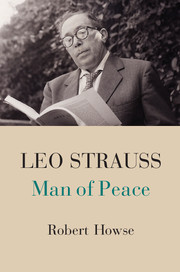Book contents
- Frontmatter
- Dedication
- Contents
- Preface and Acknowledgments
- 1 Introduction
- 2 Warrior Morality and the Fate of Civilization
- 3 Legitimacy and Legality, Thinking and Ruling in the Closed Society and the World State
- 4 Strauss’s Machiavelli
- 5 Thucydides versus Machiavelli
- 6 Justice and Progress
- 7 Conclusion
- Abbreviations
- Index
- References
2 - Warrior Morality and the Fate of Civilization
Strauss’s Encounter with Carl Schmitt and “German Nihilism”
Published online by Cambridge University Press: 05 September 2014
- Frontmatter
- Dedication
- Contents
- Preface and Acknowledgments
- 1 Introduction
- 2 Warrior Morality and the Fate of Civilization
- 3 Legitimacy and Legality, Thinking and Ruling in the Closed Society and the World State
- 4 Strauss’s Machiavelli
- 5 Thucydides versus Machiavelli
- 6 Justice and Progress
- 7 Conclusion
- Abbreviations
- Index
- References
Summary
Introduction
In Weimar Berlin at the beginning of the 1930s, Leo Strauss confronted Carl Schmitt, the most brilliant legal mind of the German right. This was when Strauss, increasingly dissatisfied with the polarized philosophical and political alternatives on offer in Weimar, was beginning to reconsider premodern thought. At that same moment, Schmitt was veering toward Nazism, although he did not actually join the Nazi party until urged to do so by Heidegger in 1933. The result of Strauss’s confrontation with Schmitt was a short essay that Strauss wrote in 1932, “Notes on the Concept of the Political,” which, in his intellectual autobiography, Strauss described as the first expression of a change of orientation of his thought. In this chapter, I consider Strauss’s engagement with Schmitt in light of Strauss’s articulation of this change of orientation in his correspondence with Karl Löwith, in particular Strauss’s deepening disenchantment with Weimar antiliberal polemics and increasing interest in premodern thought as a point of view transcending such polemics. In his 1941 lecture “German Nihilism,” Strauss would take the measure of, and severely criticize, a philosophical/political point of view represented not only by Schmitt but also by Heidegger and Ernst Junger.
Yet long after the “German Nihilism” lecture, Strauss would still feel the need to answer Schmitt and Schmittianism and call them to account. This chapter concludes by giving a sense of how Schmittian themes reemerge in Strauss’s mature writings of the 1950s and 1960s. Subsequent chapters will further illustrate how, in his engagements with Alexandre Kojève, Machiavelli, Thucydides, Xenophon, and other thinkers, Strauss returns repeatedly to the Schmittian questions of the boundaries between legitimate and illegitimate violence, the relationship of the norm to the exception, and the connection of warrior morality to civilization. But the deepest theme that is raised by Schmitt’s “manner of proceeding,” as Strauss puts it, and the one that underpins the turning upside down of Schmittian political nihilism, is whether thinking should be viewed as a polemical exercise, as commitment and will, conflict and enmity. This tendency Strauss finds visible in a nobler, intellectually more refined form in Max Weber: courage, commitment, resoluteness, and decision in the face of conflict are the virtues of intellectual and spiritual life, not only of political action.
- Type
- Chapter
- Information
- Leo StraussMan of Peace, pp. 25 - 50Publisher: Cambridge University PressPrint publication year: 2014



